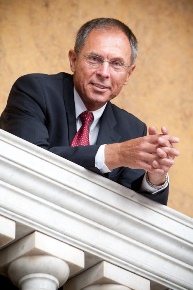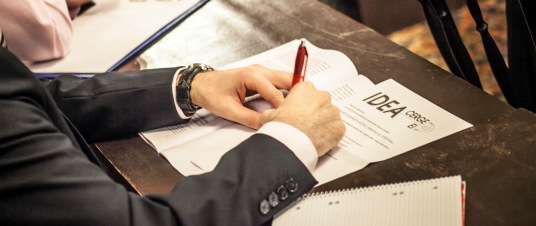IDEA Contact
(+420) 224 005 199
This email address is being protected from spambots. You need JavaScript enabled to view it.
IDEA Think Tank
Institute for Democracy & Economic Analysis
IDEA is a think-tank arm of CERGE-EI focusing on policy-relevant research and recommendations. Backed by the rigorous analysis and academic expertise of CERGE-EI scholars, IDEA contributes to policy debates with its non-ideological, evidence-based approach to public policy. IDEA is funded by private donors and public research grants.
View IDEA's research output in Czech
Motivation
 The Czech Republic has completed the systemic transformation from communism to democracy with a market economy. It is now facing the challenge of catching up with the most advanced countries in the quality of its democracy and level of economic development. For the Czech Republic to be successful in international competition, it is essential to realize its full potential. In this context, the country faces a great need to improve and broaden the nature of public discussion. In particular, the public at large and many public officials and business leaders feel that the existing government and non-government organizations, while useful, do not generate a sufficiently broad-based and rigorous discussion of the important issues and that the resulting policies are often adopted on partisan grounds, rather than on the basis of a broader political or societal consensus - based on facts and reasoned analysis.
The Czech Republic has completed the systemic transformation from communism to democracy with a market economy. It is now facing the challenge of catching up with the most advanced countries in the quality of its democracy and level of economic development. For the Czech Republic to be successful in international competition, it is essential to realize its full potential. In this context, the country faces a great need to improve and broaden the nature of public discussion. In particular, the public at large and many public officials and business leaders feel that the existing government and non-government organizations, while useful, do not generate a sufficiently broad-based and rigorous discussion of the important issues and that the resulting policies are often adopted on partisan grounds, rather than on the basis of a broader political or societal consensus - based on facts and reasoned analysis.
Mission
To help to remedy this situation, we have created the Institute for Democracy and Economic Analysis (IDEA) - a modern and politically independent think-tank that will (a) generate and disseminate a broad range of leading ideas for policy, based on solid analysis, (b) contribute to the creation of a national vision and strategy for the future and (c) provide citizens with sufficient information to make their voices heard in public life and to hold their elected leaders accountable to the public interest.
Model
In its formation and functioning, IDEA will draw on successful aspects of leading think-tanks and policy institutions in other countries, including the American Enterprise Institute, Brookings Institution, Peterson Institute, The Third Way Institute, and the Center for Global Development in the United States; Institute for Public Policy Research (IPPR), Centre for Policy Studies (CPS), Center for Economic Policy Research (CEPR), the Royal Institute for International Affairs ("Chatham House"), and Royal Society of Arts (RSA) in Great Britain; the Centre for European Policy Studies (CEPS) in Belgium; the Bertelsmann Foundation and Stiftung Wissenschaft und Politik in Germany; the DeBenedetti Foundation in Italy; and the CASE Foundation in Poland. Some of these institutions are politically oriented, while others are politically independent. Both types of organizations are also active in the Czech Republic. The politically oriented ones - i.e., those affiliated with one or another political party - already play a relatively important part. IDEA is politically independent and aims to carry out socially beneficial activities.
Activities and Human Resources
IDEA’s activities range from (a) participating in parliamentary hearings, speakers, round tables, workshops and conferences, and town meetings with citizens to (b) creating broadly available policy briefs and position papers, and (c) disseminating information via web/internet and media communication.
IDEA’s intellectual and policy content is provided by senior and junior fellows, academics, professionals, and policy makers from both the Czech Republic (CR) and abroad. IDEA is directed by Professor Jan Svejnar, and managed by a team of administrators with experience in relevant public and private sector work.
While focusing on its core activities, it also collaborates with Czech academic institutions and builds bridges to other NGO’s in the policy relevant areas, so as to maximize effectiveness and bring about greatest benefits for the Czech Republic.

Focus
In the initial phase of its activities, IDEA focuses on the following topics:
- The Czech Republic and European Union (EU) and the security situation in Europe – the role of the EU in a global world, CR’s strategy vis-a-vis EU, adoption and role of the Euro, national and European security
- Economic and social reforms – public finance, education, R&D and innovation, healthcare, pensions, labor market
- Environmental and energy issues – questions related to global warming, CO2 emission limits, trading permits, energy dependence and diversification
- Functioning of the government – ethics in public policy, courts and the legal system, public procurement on both, the central and local levels, efficiency of the regulatory system
- Topical issues – rapid analytical response to emergencies and sudden developments, formulation of leading issues, e.g., the preparation of analyses and suggestions for economic crisis management

Guiding Principles
In its activities, IDEA is guided by the following principles:
Creating policy consensus on the basis of intellectual openness – accepting free competition of ideas; being open to ideas generated in all parts of the world; re-evaluating existing positions in the face of new challenges
Using the best theoretical and empirical frameworks – striving to develop policies on the best conceptual framework and empirical evidence (from the CR and abroad)
Focusing activities on creating effective policy and strategy in the CR – complementing academic institutions by formulating documents in an operationally effective way










